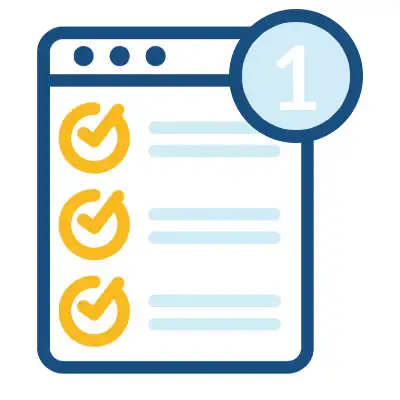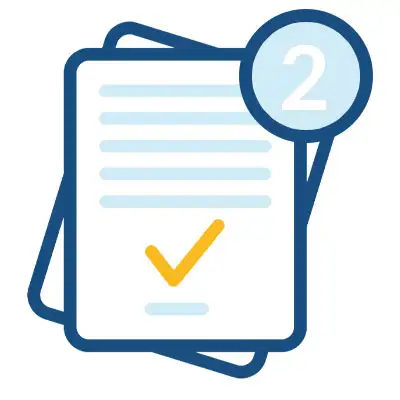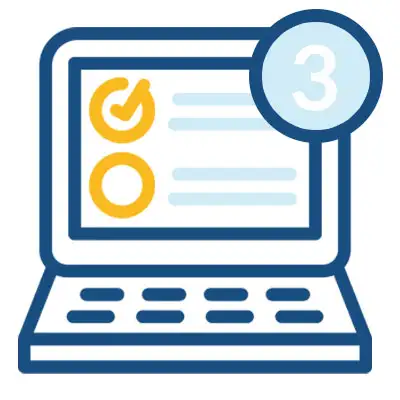Doctor of Occupational Therapy
Admissions Requirements
Holistic Admission Process
Academic history is balanced by personal traits that reflect those needed within the healthcare environment and by skills and background characteristics to provide an opportunity for admission of students with a wide variety of strengths. This process promotes a learning community that can learn together and from each other, as we all focus on developing excellence while celebrating differences. All admissions requirements are reviewed on a case-by-case basis.
3-Step Application Process

Meet all admissions requirements.
- Completed a minimum of 90 undergraduate credit hours or a bachelor’s degree.
- Current OTAs are encouraged to apply.
- A cumulative GPA of 3.0 and above. Students with a GPA below 3.0 will be reviewed on a case-by-case basis.
- No GRE required.

Gather the documents you need to apply.
- Transcripts.
- Plan for completing pending prerequisites.

Complete your application through OTCAS.
- Applications are submitted through the OTCAS
- Students can now apply for Fall 2026
- OTCAS Deadline for Fall 2026 applications is June 6th, 2026.
- All in-progress applications have to be submitted by the deadline.
Applications may be submitted with pending requirements; however, applications will not be reviewed until all requirements are met. Eligible applications with all the completed prerequisite coursework, including transcripts for undergraduate credit hours, will be reviewed upon submission.
- The OTD program currently does not admit international students
- SCU will review and contact eligible applicants for virtual interviews
The OTD program admission standards do not allow advanced placement, transfer of credit or credit for experiential learning.
Program Questions?
- Connect 1-on-1 with an SCU Advisor – schedule a phone appointment with an SCU Doctor of Occupational Therapy Advisor to discuss your path to becoming a future healthcare professional and any questions about the SCU program. Schedule here.
- Email OccupationalTherapy@scuhs.edu with any questions.
- Call our Admissions Department at 562-475-4604
I. Degree Requirements
In addition to the other prerequisites listed below, you may apply for the OTD program if you have completed a minimum of 90 undergraduate credit hours with a combination of science and liberal arts coursework from an accredited institution. A U.S. bachelor’s degree or higher from an accredited college or university will also be accepted. An accredited college or university is an institution that holds active accreditation recognized by the Department of Education.
II. Required Courses
All prerequisite courses must be completed at an accredited college or university. Applications may be submitted with pending prerequisite courses; however, the application will not be reviewed until the official transcript for each pending course is uploaded by OTCAS. Official transcripts verifying successful course completion for all submitted applications must be uploaded to OTCAS by the recommended date of August 31, 2025.
- All prerequisite non-science courses must be completed with a minimum grade of 2.75 or above. Overall GPA (calculated by OTCAS): 3.0 or above is preferred
Pass/fail grades will be reviewed on a case-by-case basis. However, please note that pass/fail grades are not calculated into the OTCAS GPA.
Students who are missing a prerequisite course requirement or are looking to improve their GPA can choose to take an SCU Accelerated Science course and complete the requirements in as little as five weeks. SCU’s Accelerated Science courses are prequalified and guaranteed acceptance for this program. Click here to learn more.
CORE SCIENCE COURSES
Core science courses must be completed with a minimum 3.0 grade or above.1 Each course used to satisfy the requirements below must include a lab and have been completed no earlier than 7 years from the current admissions cycle. Introductory level courses are accepted, but upper-level courses are preferred. Online courses and labs are accepted.
- Human Anatomy2 (4 credits, lab required)
- Human Physiology2 (3 credits) or A & P combined:
- Human Anatomy and Physiology I (4 credits, lab required)
- Human Anatomy and Physiology II (4 credits lab required)
1The core science prerequisite GPA includes human anatomy and human physiology.
2A combination human anatomy & physiology course will be accepted; however, you cannot use the same course to fulfill both the anatomy and physiology prerequisites. If not titled “Human”, a course description must demonstrate a human focus.
GENERAL COURSES
Online courses and labs are accepted.
- Abnormal Psychology (3 credits)
- Human Development (lifespan) (3 credits)
- English Composition* (3 credits)
- Introduction to Sociology or Cultural Anthropology (3 credits) – Must be a course taken within the Sociology or Anthropology department
- Statistics (3 credits) – Must be within the math, social science, or health science department.
- Medical Terminology (1 credit) – May be taken online as Pass/Fail
* Any course not titled “English Composition” must be a writing-intensive course that includes instruction on comprehension, investigation, evaluation, explanation, and refutation.
III Recommended Courses
-
- Conversational Spanish
IV. Additional Requirements
- Professional Letters of Reference: Two (2) required*
The following guidelines are recommended for letters of reference: It is imperative the persons providing references are able to provide specific examples of strengths and accomplishments. One reference should be from a person who can address intellectual and academic abilities. One reference should be from a supervisor in a professional or other work capacity who can address work performance, service commitment, or other areas of background that may be pertinent.
Applicants are expected to demonstrate professionalism in their interactions with the program and our faculty and staff. Applicants who demonstrate unprofessional behavior at any time will not be considered for admission.
Academic or licensure infractions, misdemeanors, and/or felonies may prohibit participation in required supervised clinical practice, eligibility to take the National Board for Certification in Occupational Therapy (NBCOT) Exam and/or eligibility for state licensure. Due to this, all academic or licensure infractions, misdemeanors, and/or felonies must be disclosed on OTCAS and will be assessed by the Admissions Committee on a case-by-case basis. Failure to disclose the above will result in applicant denial and rescission of an enrollment offer, if applicable. Additionally, programs are required to report an applicant’s failure to disclose this information to the American Occupational Therapy Association.
All information provided within the OTCAS application must be truthful and complete. If falsified or incomplete information is provide, the applicant may be eliminated from the program.
V. Preferences
All admissions decisions are made in accordance with our program mission, vision, and goals. Additionally, preference is given to applicants with evidence of the following:
- Greater than the minimum GPA of 3.0 for overall and/or core science prerequisite GPA
- Observation of occupational therapy practice in two different settings documented in OTCAS
- Continuous (≥1 year) leadership and volunteer roles
- Knowledge of, and interest in, the OT profession
- Desire to work with underserved populations from diverse backgrounds
- Knowledge of, and interest in:
- Diversity, health equity, inclusion
- Lifestyle health and lifelong learning
- Teamwork
- Compassion
- Integrity
- Professionalism
- Accountability
- Humility
VI. Admissions Process
- Applicants must apply to the program through the Centralized Application Service for Occupational Therapists (OTCAS). Once a verified application is received, the Admissions Advisor will screen the application to ensure that it meets minimum admissions requirements as outlined above. Incomplete applications will not be considered.
- All applications are reviewed based on the admissions requirements and the information provided. Competitive applicants will be invited to an interview. Priority interviews will begin in January. Students must be verified in OTCAS in order to be selected.
- Candidates offered a seat in the program will have 7 days to respond to the conditional enrollment offer and complete the supplemental application, admissions agreement, and submit a $500 non-refundable deposit to be applied to their tuition. Being interviewed does not guarantee a seat in the program or on the waitlist.
- All remaining applicants will be notified of their application status (accepted, waitlisted, or denied) by September, 2025.
- Applicants placed on the waitlist may be offered a seat if an offered applicant withdraws from the program or an enrollment offer is rescinded. Waitlist applicants who are offered a seat must complete the supplemental application, admissions agreement, and submit a $500 non-refundable deposit to be applied to their tuition within 72 hours.
*SCU does not refund OTCAS application fees under any circumstance, including loss of accreditation during the application cycle.
VII. Academic Standards for Enrollment
Once the class is fully seated, information about additional requirements will be provided. These may include the following requirements which must be completed prior to matriculation.
- A physical examination completed by a licensed healthcare provider confirming the student’s ability to perform duties as outlined in the OTD program’s technical standards.
- Proof of current immunization status
- Government-issued photo ID
- Active medical insurance
- Criminal background check*
- Pre-matriculation reading and/or assignments
*Any student who has resided or is currently residing in New York may be subject to additional fees for the criminal background check retrieval per state law of New York.
VII. Student Employment Policy
- Due to the rigorous nature of the program, students are discouraged from working. Didactic and clinical schedules will not be altered for employment.
- Students of the program are not employees of the hospitals or clinics and, therefore, work entirely under the preceptor’s supervision. Students are not to substitute for paid clinicians, clerical staff, or other workers at their assigned clinical sites.
IX. Technology Requirements
- Please see the technology requirements for all new and continuing SCU students.
